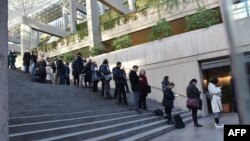China is stepping up the pressure on Canada as a bail hearing for tech executive Meng Wanzhou continues Tuesday in Vancouver. At a hearing on Monday, the defense for Huawei’s chief financial officer argued that Meng be released on bail while she waits for extradition to the United States, a process that could take months, perhaps years.
Monday’s proceedings were largely focused on a proposal from Meng’s defense lawyer for bail conditions.
Lawyers for Meng argued she should be granted bail, saying that a combination of 24-hour surveillance, high-tech devices and a multi-million dollar bond could ensure she does not flee. They also said that if Meng fled the country she would embarrass China, calling that option “inconceivable.”
The lawyers said Meng would be willing to hire a surveillance company that would arrest her if she breaches her bail conditions and would wear a GPS bracelet at all times. They said Meng's husband would put up both of their Vancouver homes plus $750,000 for a total value of over $11 million as collateral.
Not so surety
Concerns were raised during the hearing that the surveillance company has never handled someone on bail, and the GPS bracelet company says one individual did manage to remove the bracelet before and avoid capture.
The biggest concern for the judge, however, appeared to be the use of a Meng’s husband, Li Xiaozong, as a guarantee or “community surety” that she would not flee the country. Li is currently in Canada on a tourist visa and is not a Canadian citizen. His current visa expires in February.
Prosecutors are opposing bail and note that with her company’s vast resources and the charges she faces, Meng has a strong incentive to flee.
If convicted in the United States, Meng faces up to 30 years' imprisonment. Prosecutors have accused her of committing fraud by telling financial institutions that China's Huawei was not tied to a Hong Kong-based company, Skycom, which was allegedly selling U.S. goods to Iran in violation of U.S. sanctions against Tehran.
U.S. officials say Meng misled multinational banks about Huawei's control of Skycom in order to move money out of Iran.
Flight risk
Meng also has at least seven known passports and U.S. prosecutors have noted that she has avoided traveling to the United States since March of last year, despite the fact that she has a son studying in Boston.
Meng is believed to have stopped traveling to the United States when her company became aware of an investigation into the telecommunications company. A letter from the Department of Justice opposing bail notes that Meng is not the only Huawei executive who has avoided the United States since then.
Additionally, “Huawei took steps to move U.S.-based Chinese national employees who may have had knowledge of facts related to the investigation out of the United States.”
Meng’s lawyer argues she has stayed away from the United States because of the “hostile” climate toward Huawei.
Huawei and Meng have denied any wrongdoing. In a statement on Monday, the company said: “We will continue to follow the bail hearing tomorrow. We have every confidence that the Canadian and U.S. legal systems will reach a just conclusion.”
O Canada
Despite the company’s measured approach, the response from the Chinese government and state media has become increasingly shrill. Both the U.S. and Canadian ambassadors in Beijing have been called in and warned about the consequences the case could have if Meng is not released.
There have been threats to boycott Canadian goods and a lawyer has called for an investigation into the Shanghai-based subsidiary of UK-based banking giant HSBC and its role in Meng’s arrest.
State media have accused Canada of human rights violations and acting like it was the U.S. 51st state.
An opinion piece in the communist party backed People’s Daily said: “Rather than frequently act like America’s trusty sidekick, Canada should exercise its sovereign right to reject the underlying anti-China bias driving the U.S. government’s plan to crush Huawei.”
The article said China’s message to Canada is clear: correct your mistakes, stop violating Meng’s lawful rights and give the Chinese people a “proper explanation” for this “disgusting and vile act at the behest of the United States.”
If not, the article warned, “Canada will pay a heavy price.”
The Global Times has said it will not be fooled by Canada’s judicial independence. Among other things, the article took issue with reports that Prime Minister Justin Trudeau was told about the arrest several days before hand and a post on Twitter from former Canadian foreign policy adviser Roland Paris.
“Canada may very well have the world’s most perfect judiciary system that it claims to be fully independent from political influence, but that’s not even close to explaining why Canada took such a politically charged move without offering any legal explanation,” the article said.




